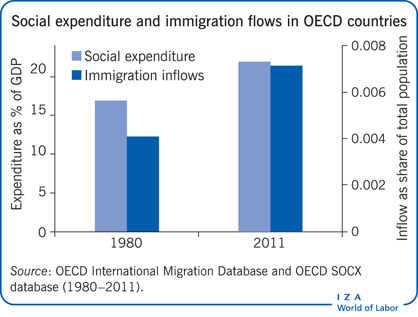Elevator pitch
Contrary to the welfare magnet hypothesis, empirical evidence suggests that immigration decisions are not made on the basis of the relative generosity of the receiving nation’s social benefits. Even when immigrants are found to use welfare more intensively than natives, the gap is mostly attributable to differences in social and demographic characteristics between immigrants and non-immigrants rather than to immigration status per se. Moreover, evidence in some countries suggests that immigrants exhibit less welfare dependency than natives, despite facing a higher risk of poverty.

Key findings
Pros
There is no strong support for the welfare magnet hypothesis.
Immigration is primarily driven by differentials in unemployment and wages between the sending and destination countries, by the presence of social networks, and by geographical proximity.
When immigrants are found to use welfare more intensively than natives, the gap is mostly attributable to differences in the social and demographic characteristics between the two groups.
Active welfare policy can reduce duration of social assistance use by immigrants
Cons
Eligibility constraints, linguistic deficiencies, cultural and social norms, and discrimination often limit immigrants’ welfare access.
Immigrants face a higher risk of poverty than natives, which is often not adequately compensated by welfare benefits.
When existing, welfare dependency decreases with the time spent in the host country, but at a slow rate.